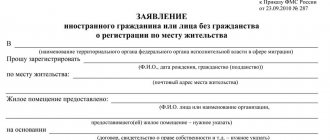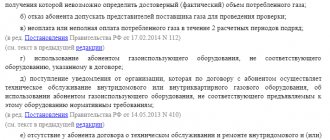Having a share in an apartment or house, you can dispose of it as you wish. Including registering anyone as a shared owner. This person may or may not be your relative, it makes no difference. But serious conflicts often arise on this basis.
What to do if, for example, a tenant registered as a shareholder drinks and interferes with the lives of others? What to do if your ex-husband refuses registration for your new husband? Of course, a lot is specified in the law. But each case is individual. Therefore, we will give you general information, but we recommend that you consult with a housing specialist regarding your specific situation.
Don't have time to read the article?
Get an initial consultation from several companies for free
: fill out an application and the system will select suitable companies!
124 companies are connected to this service
Start selection in a few clicks >
The registration rules are regulated by Federal Law No. 5242–1 “On the right of citizens of the Russian Federation to freedom of movement, choice of place of stay and residence within the Russian Federation” dated June 25, 1996. It stipulates the terms and conditions of permanent and temporary registration, as well as sanctions for failure to register at the place of residence.
Temporary registration in an apartment with two owners
When I was getting ready to send my child to kindergarten, I was faced with the need to register him temporarily in our area. The apartment has two owners, one of them is me. I wondered whether the consent or presence of the second owner was necessary when registering temporary registration.
Nothing useful was found on the Internet, except for the unexpected turn that the consent of the child’s father may also be required. Imagining the crowd of people who needed to be brought to the OUFMS, I became sad.
Moreover, registration was urgently needed, the second owner was very busy, and her husband had just asked for time off from work. I applied for public services, the next day they called me from the passport office, and at the same time I asked my questions. So - 1.
Since the apartment is not jointly owned, but in shared ownership, I can safely register myself and my child on my share without the consent of the second owner. 2.
But such an obligation does not in any way limit the citizen’s right to freedom of movement.
Also, such accounting is necessary for the state to conduct a correct migration policy.
Reflection in the law Freedom of movement throughout our country, as well as the free right to choose any place of residence, is guaranteed by the Constitution of the Russian Federation.
But, the procedure for registering citizens and deregistering them from it is regulated by the Law of the Russian Federation of June 25, 1993 No. 5242-1 “ On the right of citizens to freedom of movement, choice of place of stay and residence in the Russian Federation.”
The obligation of citizens to be “attached” to a specific address, that is, to have a permanent residence permit, is reflected in Government Decree No. 713 of 17.
07. 1995. Attention The concept of shared ownership is explained in paragraph 2 of Art. 244 Civil Code of the Russian Federation.
Carrying out registration in shared ownership (registration)
Everything that directly concerns registration is set out in Federal Law No. 5242-1 “On the right of citizens of the Russian Federation to freedom of movement...”. Important But the provisions concerning the rights of owners of common property are in the Civil Code.
The norms of the Housing Code are partly applicable to these relations. Responsibility Since registration (registration) is the responsibility of a citizen, failure to do so is fraught with unpleasant consequences.
Violation of the registration rules provides for:
- administrative responsibility;
- criminal liability.
The range of penalties is wide: from a fine to imprisonment for up to 3 years.
Responsibility arises not only for citizens who violated the deadlines and registration procedures, but also for legal entities.
Apartment owners are responsible for fictitious registration in them.
Forbidden
The obligation of citizens to be assigned to a specific place, that is, to have permanent registration, is indicated in Government Decree No. 713, which was issued on July 17, 1995.
The concept of shared ownership of real estate is established in accordance with paragraph 2 of Article 244 of the Civil Code, and the responsibility that is imposed on citizens in the absence of registration is specified in Article 19.15.1 of the Code of Administrative Offenses.
Article 244. Concept and grounds for the emergence of common property Article 19.15.1.
About my life
However, there are two ways out of this situation:
- The first one is risky.
Donate your share to a relative who needs to be registered.When donating, there is no need to ask the consent of the remaining owners and offer them a preemptive right.
On the other hand, nothing will prevent the new owner from evicting the donor in the future.
- The second one is long but reliable. If the share in the apartment is large enough, then you can try to divide the apartment into separate rooms. This is done through the court. If successful, the apartment will turn into a communal apartment.
The procedure for registration in housing that is in shared ownership
But it should also be noted that having a residence permit does not give any right to living space, other than the possibility of residence.
You can dispose of housing only if you have ownership rights. Therefore, in most cases it depends on the owner whether he gives his consent to registration or not.
Regulatory framework The main legal act regulating the procedure for registering citizens is Law of the Russian Federation No. 5242-1 of June 25, 1993.
This standard includes quite a few sections that provide for all possible nuances regarding the registration and validity of registration.
Article 1 of this law states that Russian citizens have the right to freedom of movement.
That is, within the Russian Federation, a citizen is free to choose a place to live.
Article 2 contains the main terms used in the act.
Article 3 establishes the need for permanent registration at the place of residence.
To do this, you must be registered in the system. Registration is not that difficult; the system itself provides the necessary hints.
After registration, you need to log in and find the necessary government service.
Next, following the system prompts, you need to fill out an application and also attach scans of the required documents. Scans are attached to the application in exactly the format required by the system. After sending all documents, a notification will be sent to the email address specified during registration indicating that the documents have been accepted for consideration.
A specific date will also be indicated when you need to appear at the FMS with your passport for a stamp.
Necessary package of documents To register another person in a residential premises that is in shared ownership, it is necessary to prepare a package of documents.
Permanent registration is registration at the place of residence, and temporary registration is registration at the place of stay.
For what purpose are they registered? Registration at the place of residence gives the registered person certain rights, namely, what registration gives is:
- live at the place of registration;
- get on the waiting list at a preschool and send your child to kindergarten;
- choose a school near your place of residence;
- arrange benefits and benefits;
- receive medical care in a hospital or clinic at your place of residence;
- confirm your place of residence when applying for employment;
- receive official documentation (medical policy, TIN, etc.).
Lack of registration makes life in society difficult. In addition, this is a violation of registration rules and is punishable by a fine. But sometimes the owner of rental housing is in no hurry to register tenants. In this case, you can submit a lease agreement to the Federal Migration Service and, on its basis, issue a temporary registration.
For permanent residence Permanent registration is issued on the basis of an application from the owner.
A standard package of documents is submitted, including documents for the apartment and statements from the owner and the registered person.
At the same time, employees of the registration authority do not have the right to demand documents not provided for by law.
You should also know that if the owner agrees, the authorized bodies do not have the right to refuse registration. For example, there are situations when the passport office refuses to issue a registration due to a discrepancy between the accounting standards for living space per person. You should know that such a refusal is only legal when registering in municipal housing.
Conditions for registration in a shared apartment or house
Common property becomes shared property for various reasons. The owner can donate or inherit it to several persons. It is also possible to divide the property of spouses during a divorce. In this case, you can get both a real share - that is, a room or several rooms - and an ideal one. An ideal part of an apartment or house in fractional terms is called - for example, ¼ of the entire area.
If you are the owner of shared property, then you can register any person in your living space. But for this you need to obtain written consent from the co-owners. The exception is when you want to register your child (under 14 years old). Then the consent of other shareholders is not necessary. Although here, too, the law provides for circumstances that make it possible to evict a minor.
When it comes to a private home, the rules are slightly different. The consent of the co-owners is only needed when the house has a common entrance and common non-residential premises: kitchen, bathroom, etc. This rule does not apply to isolated premises with a separate entrance.
You can apply for registration at the passport office, the migration service, the Multifunctional Center (MFC) or through the State Services website.
Registration of registration in an apartment or private house with shared ownership
It is not necessary that registration in an apartment with shared ownership should be carried out if there is one owner. Another news! If you are a co-owner, then you have every right to register new residents in your premises. The consent of the other party is not required. A common minor child of both spouses is registered in the territory of one of the parents automatically.
You can register yourself and your relatives either permanently or for temporary residence. According to the Government Decree, it is necessary to take into account the fact that registration is only possible in residential buildings. That is, if anywhere in your plot of land there is no territory suitable for annual residence, then you cannot register for registration here.
Required documents
When contacting official authorities in person, it is important that all co-owners of shared ownership are present. They draw up consent for registration and attach it to the main package of documents, consisting of:
- Passports of the applicant (person who needs registration).
- Birth certificates of a child under 14 years of age or passports - from 14 to 18 years of age.
- Military ID (for those liable for military service).
- Certificates of release from places of imprisonment (for convicted persons).
- Applications in form No. 6.
- Documents confirming ownership of the share where registration is being issued, and the legality of its acquisition.
- Consent of co-owners of the living space.
There is no strict form of consent itself. If it is drawn up in writing, it must contain the following information:
- passport details;
- place of registration;
- consent to stay;
- applicant details;
- date and signature.
It is not necessary to notarize a document, except in cases where it must have a clear validity period. Otherwise, consent is considered unlimited. During a personal visit to the passport office, you do not have to write consent, but give it verbally by presenting your passport.
However, the child is automatically registered in the apartment, and nothing depends on the opinions of other owners. According to Art. 20 of the Civil Code of the Russian Federation, children under 14 years of age live where the father and (or) mother are registered. Before receiving a passport, the application is written for them by their parents, after that - by the children themselves, but in the presence of their parents.
Registration in shared ownership
The current legislation does not include any mandatory conditions regarding the fact that registration is provided only for any real estate that has only one owner, since in the vast majority of cases the privatization procedure for municipal property provides for the registration of several owners at once. The same type of ownership sufficiently appears in the event that real estate is given as a gift or an item of inheritance.
Common property also appears if a family buys its own home using funds received from maternity capital. Thus, it is possible to register a property that is in common ownership, but to do this, several important subtleties will need to be observed.
In a private house or privatized apartment
Shared ownership provides for the presence of several owners of a certain property at the same time, and there is no difference in what share each owner has. In order for one of the owners to register another person in the specified apartment, he will need to first obtain written consent from the other owners, regardless of what share they have in the specified premises.
The only exception to this rule are minor children of any owner, since registering for them does not require the need to obtain consent from any of the other owners, since every child has the guaranteed right to live with their parents.
In the same way, a private house can be in shared ownership, but this category includes only those buildings that provide the possibility of year-round living and are officially designated as residential premises. Country cottages cannot be classified as private houses suitable for habitation.
In addition to the fact that each owner must provide his written consent to carry out this procedure, he must also personally visit the passport office to sign this consent in the presence of an authorized officer, and also present the original of his civil passport.
If one of the owners does not have the opportunity to personally visit the passport office and draw up the necessary documents, he can use the services of a representative, but a notarized power of attorney must be issued to this person.
It is also worth considering the fact that if a person has an allocated share in real estate, he does not necessarily have to obtain consent from the other owners. In particular, this applies to situations where the share of real estate owned by the interested party has its own entrance and exit, in no way adjacent to another exit, and also has its own kitchen and bathroom.
Sample owner's statement of consent to registration
Temporary
As in the case of permanent registration, in this case it will be necessary to obtain the consent of each owner, and the lease agreement concluded with the new tenant will also need to be attached to the standard package of papers, which will subsequently be used as the basis for the transfer of taxes. If the person being registered is a close relative of one of the owners, execution of the contract will not be mandatory.
The labor exchange can be located at the place of residence or registration - the citizen himself decides which department is easier for him to apply to. Read about changing your individual entrepreneur's address here.
Registration of temporary registration is required if the specified person intends to stay in the apartment for more than three months.
After submitting documents for consideration by civil servants, in the vast majority of cases it takes about eight working days, after which he is issued a certificate confirming the fact of temporary registration, or a written refusal, which will indicate the reason for the decision.
Is it possible to do this without the consent of the other residents?
Without receiving consent from all other owners of the property, registration can only be completed by the owner himself, and in this case it will not make any difference exactly what share of the apartment he has, and how many citizens have already been previously registered on the territory of the specified property. For those apartments that are privately owned, there are no standards for the provision of housing.
In addition, as mentioned above, if a person registers his own child, registration in shared ownership will also be carried out without consent.
The reason for this is that until children reach the age of fourteen and do not have their own passport, current legislation does not provide for the possibility of registering them separately from their parents. Thus, the registration procedure will be carried out in any case, even if the other owners are categorically against this operation.
The same applies to spouses, but does not affect all other blood relatives. If it is necessary to obtain registration for a brother, father, mother and other family members, you will have to first obtain the written consent of the remaining citizens who have the right of ownership of the specified premises.
Nuances of registration through State Services and MFC
If you want to register someone in your shared ownership through State Services, the package of documents will be the same. But you will additionally need an extract from the house register and copies of the passports of the co-owners. And it is important to understand that registration is impossible completely remotely. Through the website you will send an application to the Ministry of Internal Affairs (Office of the Ministry of Internal Affairs). On the appointed day, you will have to report to your local branch with the original documents. And only then will they give you a stamp.
To apply for registration through the MFC, you need the same documents as for the migration service or passport office. But the difference lies in the timing. The passport office allows 3 days for the entire procedure. The MFC sends documents for verification to the Ministry of Internal Affairs, so the period increases to 6–10 working days.
Registration procedure
The procedure for changing the place of residence begins at the passport office at the old place of residence, where it is necessary to deregister. After this, an application is written to the accounting authorities responsible for the site with new housing. After a few days, the registration procedure will be completed, and the corresponding stamp will appear in the passport.
Required documents
Federal Law No. 5242-1 states what documents are needed to obtain registration:
- certificate of removal from the old place of registration;
- passport;
- a document recording the right of ownership of residential premises (for owners);
- a statement accompanied by the written consent of other owners (or in their presence, orally).
No other documents are required for registration.
What to do if co-owners are against registration?
Unfortunately, for various reasons, shareholders are often on bad terms. This is especially true for divorced couples, but there may be other options. In general, neighbors sometimes turn out to be against registration without any reason. What can be done in this case?
Here you can go two ways: allocate a share of property in kind or try to sell part of your living space. The first option is not suitable for anyone - it requires redevelopment of housing. If you allocate a share in kind, it is necessary not only that the premises be isolated, but also that communications “do not intersect.”
The second option is to sell your part of the living space or issue a deed of gift. Let's say right away that selling is risky. Co-owners can take advantage of Art. 250 of the Civil Code of the Russian Federation - the primary right to buy out a share. The shareholders' consent is not required to formalize the deed of gift. But you must understand that if you donate your share or part of it, the new owner will be able to dispose of it at his own discretion.
Example of conflict resolution
Let's see how all this works in practice. For example, let's take a married couple who own shared property. Upon divorce, each spouse received ½ of the common apartment. After some time, the co-owner remarried and decided to register a new husband. However, the ex-husband is categorically against it for some reason. What can an ex-wife do?
The best way out is to give your new spouse part of your share. Then he will become the full owner of ¼ of the living space and will be able, for example, to register children from his first marriage, if he has any.
Lawyer Anisimov Representation and defense in court
- No, the consent of other owners is not required. Personally, I own one-fourth of the house. I may well sell my share (if, of course, there is a buyer), and also register someone there at my discretion.
- If a person himself wants to register in an apartment or house where he is the owner of a share in this apartment/house, then he will be registered without the consent of the other owners.
We recommend reading: Payment of housing and communal services by large families
To register, the citizen and the owner of the apartment must come to the institution. If one of these people is unable to be present in person, it is necessary to draw up a power of attorney and have it certified by a notary. All owners must give consent, regardless of whether they are registered in the privatized apartment or not. If there is only one owner of the property, and the others living in it are only registered, then their consent is not required.
How to prevent unwanted registration?
Let's consider the reverse situation. You are a co-owner of the shared property. Some of the other shareholders want to register a relative, friend, etc., but you don’t want that. Of course, it is impossible to register a third party without your consent. But another owner can draw up a deed of gift without asking anyone, and then this person will become a co-owner. What to do in this case? Let's look at an example.
The couple divorced and divided the two-room apartment equally. Some time later, the man married again and decided to register his second wife. Since his ex-wife lived in the same apartment, she spoke out against it. But the husband gave part of his property to his new wife, making her a co-owner. Then the ex-wife decided to sell her share to a legal entity. The husband received notification of this. Realizing that the legal entity would try with all its might to get him out of the apartment, he exercised the right to buy out the share at the price offered by his ex-wife.
This is a rather cunning scheme, but it does not violate the law in any way. After all, the shareholder can dispose of his property as he pleases. However, in this case, the wife could go to court with a demand to cancel the registration. Such issues are usually considered on an individual basis.
Claim for recognition of the share as insignificant
In the example we looked at, the husband gave his new wife part of the share. But since he owned one room, it was no longer possible to allocate a share in kind after the deed of gift was drawn up. Because the room cannot be physically divided in half without damaging property.
The ex-wife could insist that the share be recognized as insignificant and demand a forced sale of the property. To do this you need to file a lawsuit. But there is one “but” here. For the claim to be accepted, the defendant must not be interested in the use of the living space. And he must also have other housing.
This method does not apply to our example. The ex-husband did not want to give up his share and lived in the apartment permanently. Therefore, we had to use a deceptive maneuver. But it is completely within the framework of the law.
Do you need the consent of other owners?
Art. 247 of the Civil Code of the Russian Federation says that only owners can dispose of property by coming to a common decision. If the owners cannot come to a common decision, then the proceedings go through the court.
The possibility of registering in an apartment with shared ownership without the consent of neighbors depends on the type of share:
- Registration in an ideal share without the consent of other owners is prohibited. Such a share is a part of residential property without actual ownership, i.e. a person owns part of the living space, for example, 1/3 of an apartment/house, but the territorial boundaries of his personal space are not defined.
- Registration in a share allocated in kind without consent is possible, but is associated with the difficulty of isolating the share itself. Allocation in kind is only possible if the owner is provided with a room that is separated from the rest of the living space and has a separate entrance and bathroom. Division of real estate in kind is possible in two ways:
- through an agreement of the owners, certified by a notary;
- judicially.
Note: the owner of a share of residential premises also does not need to ask permission to register for himself personally.
The same rule applies to the owner’s minor children, because The place of residence of children is the place of residence of their parents/parent.
We talked in detail about how a child’s registration is completed and whether registration at the place of residence without parents is possible in a separate article.
What to do if they don’t give it?
- In this case, you can try to persuade the other owners, but often this idea fails in the bud.
- You can issue a deed of gift to a person who needs registration (usually close relatives). In this case, he will be registered as a co-owner.
- If the layout of the property allows, you can allocate a share by agreement of the owners, which must be certified by a notary, or in court and register it without the need to obtain consent. The allocated share must be registered with Rosreestr.
- If the layout does not allow you to allocate a share in kind immediately, it is permissible to make a redevelopment/reconstruction of the premises, which must be legalized. This option is possible in a private house (is it possible to register in the house and under what conditions?). After receiving a separate technical passport for the share allocated in kind, you need to register it with the Rosreestr as a separate property. After which registration without the consent of other owners becomes possible.
What rights does a registered person have?
If you have registered for your shared property, please note that the registered person becomes a full-fledged user of the housing. And when donated, it becomes a co-owner. The new shareholder has the same rights as others. In particular, he can:
- register immediate relatives in the apartment: children, spouses or parents without the consent of other owners;
- use housing as a permanent place of residence;
- pay for housing and communal services and make other payments;
- allow or prohibit the registration of other residents.
Registration registration - and even more so, a property donation agreement - requires a high degree of trust. You should not register housing for people you don’t know.
How to evict an unwanted neighbor?
Not in all cases, persons registered or who have purchased a share turn out to be law-abiding citizens. They can poison the lives of neighbors in a house or apartment. But is it possible to get rid of them? A simple application to the prosecutor's office or a lawsuit in court will not be enough. The law protects the rights of citizens. Therefore, there may be two options: to buy part of the living space from an unwanted neighbor or to prove that he does not have legal rights to a share of the property.
In the first case, you will have to persuade the co-owner for a long time. And since we rarely want to evict those who have a good relationship with us from their apartment, it is hardly possible to achieve agreement here. Most likely, the neighbor will name a fantastic price or refuse the offer altogether.
You cannot prove the illegality of property ownership on your own. Only a lawyer can present evidence that the share was purchased by fraud or that the registration was done in circumvention of the law. But if you can convince the judge of this, the property will go to your disposal. And you can either give your neighbor temporary registration or oblige him to vacate his home.
Sources:
Pre-emptive right to purchase
The right to choose a place of stay and residence
Sample application form No. 6









